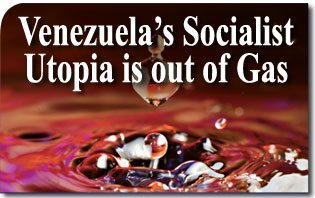
Resource rich Venezuela, which boasts of having some of largest oil reserves in the world, has now reached an all time low in petroleum production. The exportation of crude oil used to account for 95 percent of Venezuela’s export earnings until, the late socialist savior, Hugo Chávez began to re-distribute the country’s wealth in the form of cash subsidies. Now Venezuela’s petroleum minister, Rafael Ramirez, is considering importing Algerian oil in a desperate attempt to shore up their devastated economy to thwart bankruptcy.
Venezuela has always had to deal with the problem of extra heavy crude oil from the Orinoco Basin. This region produces a crude oil that is too dense to be transported through pipelines to local ports and then exported abroad. To deal with this problem, the heavy crude oil is usually diluted with super light sweet crude oils. However, this issue is insignificant when compared to the poor management of the state owned oil giant Petróleos de Venezuela Sociedad Anónima (PDVSA).
Venezuela can produce light oils needed to dilute Venezuela’s heavy crude. However, production has been curtailed by a lack of investment, abandoning the exploration of light crude and the nationalization of companies that formerly produced light crudes. This is the result of the government-run oil giant that is now being controlled by inexperienced bureaucrats who are obsessed with taking disproportional amounts of money out of the coffers. In modern parlance, it is called killing the goose that lays the golden egg.
The Venezuelan government is now asking foreign companies to invest in upgrading facilities that help make heavy crude oil exportable from the Orinoco Basin. No foreign companies want to take that risk because they fear expropriation or minority ownership under Chávez’ socialist rules. Even though oil prices have risen from $9 to $100 per barrel in the last few decades, past president Chávez and current president Maduro have managed to destroy their cash cow.
When Chávez took office in 1999, PDVSA was still in private hands, employed 51,000 people and was able to produce 63 barrels of crude a day per employee. After 15 years of socialism, PDVSA was nationalized by the state, now has 140,000 employees and produces 20 barrels of crude a day per employee according to an August 14 report by the France Press news agency. This equals a stunning 69 percent loss of efficiency in 15 short years.
Logically, a government would restructure its policy to allow for private investment that would spend heavily in light crude production. It would stop subsidizing petroleum consumption at absurdly low prices.
However, this government takes no measures. In fact, Juan Fernández, former PDVSA’s executive planning director, has indicated that the government is now forcing motorists to install a chip in their car to monitor the amount of fuel they pump in their cars limiting them to 5.4 gallons per day. Rather than addressing the root cause of the shortages, the same socialists are imposing fuel restrictions to solve the very problems they caused. Such policies, whether applied to food or gas shortages, solve nothing.
There is an old story that circulated in the former Soviet Union that went like this: If the Soviet Union conquered the Sahara, what would happen? Nothing would happen for 50 years, and then there would be a shortage of sand. It seems something similar has happened to Venezuela in 15 short years. Government mismanagement is causing the oil-rich socialist utopia to run out of gas.
